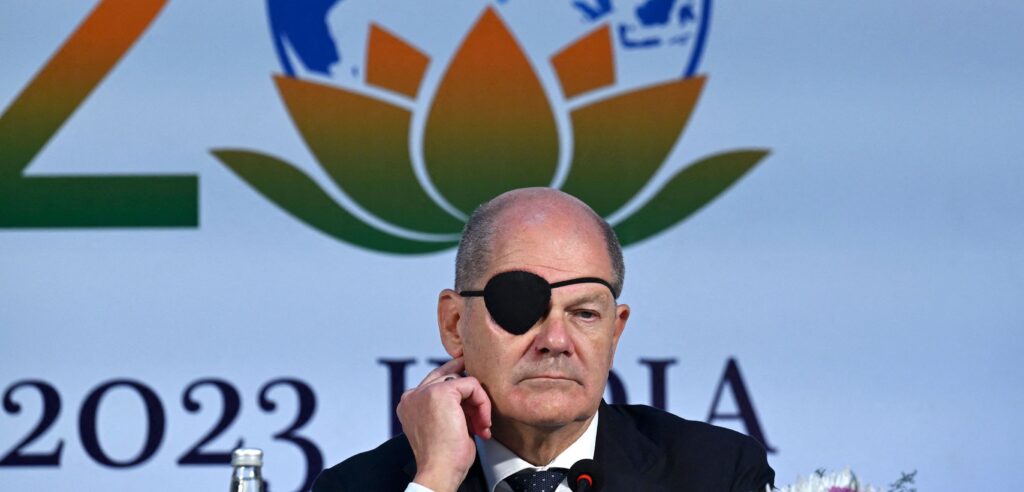Euro zone business activity declined more than expected in August, particularly in Germany, while some inflationary pressures returned, posing a challenge for the European Central Bank's efforts to control inflation without causing a recession.
Germany's business activity has seen a sharp decline, leading to concerns of a recession, as the country's Purchasing Managers' Index (PMI) dipped to its lowest level in over three years. This decline in activity is impacting the wider eurozone economy as well, with the region at risk of slipping into recession. This economic downturn is accompanied by a worrying uptick in inflation and slow growth, particularly in Germany.
Germany's economy is in a recession, with zero growth since the third quarter of 2022 and a cumulative drop of 0.5% in GDP, which is likely to continue for another half year, impacting other European economies; the country's poor performance can be attributed to its energy policy and investors are also affected.
German inflation beats forecasts, complicating the ECB's task, while US labor data eases and GDP is revised lower, causing the dollar to weaken and the euro to strengthen.
Euro zone growth is weaker than predicted, but the need for more rate hikes by the European Central Bank is not automatically voided, according to ECB board member Isabel Schnabel, who raised concerns about investors undoing the ECB's past work and the decline in real risk-free rates counteracting efforts to bring inflation back to target.
Euro zone manufacturing shows signs of improvement, while China's private PMI unexpectedly rebounds, offering hope for export-reliant economies, but Germany's manufacturing sector remains in a downturn and factory activity weakens in much of Asia.
Germany, once hailed as Europe's economic powerhouse, is now facing structural problems and could be on the verge of decline, according to experts, with factors such as stagnant GDP, high inflation, an aging population, overdependence on exports, and underinvestment contributing to its current predicament.
Europe's struggle with inflation and economic growth contrasts with the United States, as the European Central Bank's aggressive tightening risks pushing the euro zone into a downturn, with the manufacturing and services sectors already showing signs of contraction.
The European Commission has revised down its economic forecast, citing high prices for goods and services as a significant factor, leading to reduced growth projections for the European Union and the eurozone. Germany is expected to experience a downturn, while inflation is projected to exceed the European Central Bank's target. Weak consumption, credit provisions, and natural disasters are also contributing to the loss of momentum in the economy. However, the report highlights the strength of the EU labor market with a low unemployment rate.
The euro zone's economy is expected to grow slower than previously forecasted due to high inflation and Germany slipping into recession, according to the European Commission.
Germany's economy is expected to contract by 0.4% in 2023 due to higher inflation, rising interest rates, and weaker consumer spending, making it the worst-affected major country in the eurozone, according to the European Commission. The overall eurozone economy is expected to expand by 0.8% in 2023 and 1.3% in 2024, leading to a potential halt in the European Central Bank's tightening of policy. Inflation in the eurozone is projected to average 5.6% in 2023.
The annual rate of inflation in the eurozone has been revised down to 5.2% for August, but it remains well above the European Central Bank's 2% objective despite a decrease in consumer prices.
The euro zone economy is expected to contract this quarter and remain in recession as the impact of central banks' interest rate rises hampers growth, according to a survey by HCOB's flash euro zone Composite Purchasing Managers' Index (PMI), with Germany and France experiencing significant declines in business activity.
Germany, once the beating heart of the European economy, is facing structural challenges and a sense of decline, with forecasts predicting slow growth and contraction in the coming years due to its heavy reliance on manufacturing and struggle to transition to renewable energy and a service-based economy.
Euro zone annual inflation dropped to its lowest level since October 2021, falling to 4.3% in September, while core inflation decreased to 4.5%, prompting uncertainty over potential rate cuts by the European Central Bank.
The European Central Bank's efforts to curb inflation through interest rate hikes have led to the lowest inflation rate in the euro zone in two years, indicating a potential slowdown in economic growth.
The World Bank has lowered its growth forecast for developing East Asia and the Pacific, citing a sluggish China, dampened trade, and high debt levels as factors contributing to the downgrade.
The euro's outlook is worsening due to high oil prices and concerns about Italy's fiscal position, raising the risk of a return to the $1 mark.
The euro area is experiencing stagnated economic activity and weakening growth, leading the European Central Bank (ECB) to adjust its monetary policy by raising interest rates to combat inflation; however, uncertainties remain regarding the transmission of monetary policy and potential risks to economic growth.
